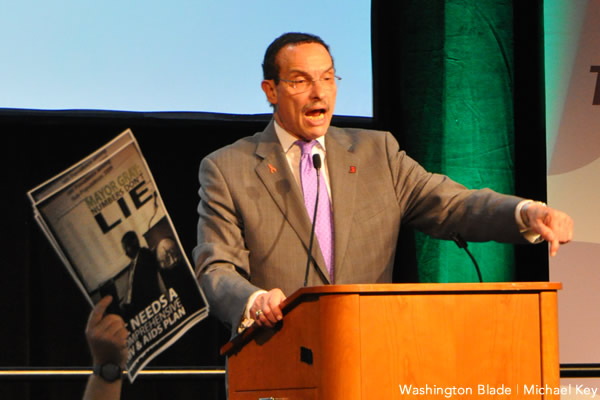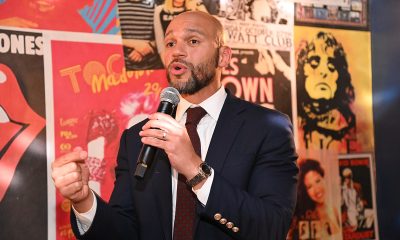Obituary
LGBT leaders still backing Gray amid scandal
Pannell says support from ‘rank and file’ gays wavers
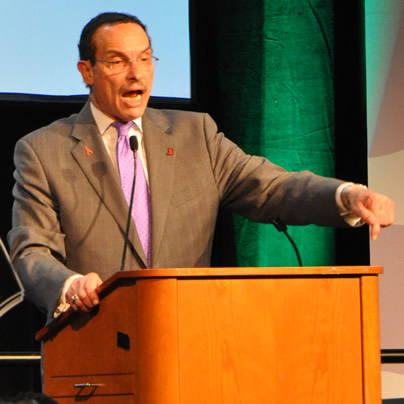
Most of the city’s leading LGBT activists say they oppose calls for D.C. Mayor Vincent Gray to resign following revelations two weeks ago that the mayor’s 2010 election campaign received an illegal contribution of more than $650,000 from a controversial businessman.
“I feel his support in the LGBT community is where it was before this happened,” said gay Democratic activist Lane Hudson, who backed Gray in the 2010 election.
“Those who supported him in the election still do for the most part,” said Hudson. “Those who didn’t support him are likely not supporting him now.”
Gray has declined to comment on a federal investigation into his campaign activities other than to deny any wrongdoing. He has not been charged or implicated in any illegal activity, although three campaign operatives have pleaded guilty to campaign violations.
Hudson and other LGBT advocates supportive of Gray say he has fulfilled his campaign support on a wide range of LGBT issues, including issues deemed important to the transgender community.
But some gay activists, including Ward 8 community leader Phil Pannell, say they believe support for Gray among ‘rank and file’ gays is wavering, just as it is among all city residents.
Pannell and Ward 8 gay activist Brad Lewis, a former president of the Gertrude Stein Democratic Club, point to a Washington Post poll released July 18 showing that 54 percent of city residents participating in the poll say Gray should resign compared to 37 percent who say he should not. Nine percent had no opinion on the issue.
“Most people I speak with in Ward 8, both gay and straight, feel he should resign,” said Pannell, who supported Gray in the 2010 election.
Lewis is among only a few LGBT leaders reached by the Blade this week who are calling on Gray to resign.
“I find it simply unbelievable that he didn’t know about this,” said Lewis.
Lewis was referring to a July 10 disclosure by the U.S. Attorney’s office that a Gray campaign operative allegedly helped to illegally disburse and conceal $653,800 in campaign funds secretly given by businessman Jeffrey Thompson. Thompson owns a company that has a $322 million a year contract to administer the city’s Medicaid program.
The campaign operative, Jean Clarke Harris, pleaded guilty on July 10 in U.S. District Court to obstruction of justice and conspiring to break federal and local campaign finance laws. She faces a possible sentence of 30 to 37 months in jail.
Gay activist Rick Rosendall, who serves as vice president of the Gay and Lesbian Activists Alliance, said in a July 17 column in the Huffington Post that he counts himself among the large number of LGBT people who remain loyal to Gray based on Gray’s long record of support for LGBT rights both as mayor and as chair of the D.C. City Council.
“Beyond loyalty, I take pause from the behavior of U.S. Attorney Ron Machen’s office, whose slow dribbling out of information has set off a media feeding frenzy and a rush to judgment that serve neither justice nor the city’s interests,” Rosendall wrote.
Rosendall and other activists backing Gray note that unlike every other state and large city, where the lead prosecutor is elected by the people, D.C.’s prosecutorial office is headed by a federally appointed United States Attorney who doesn’t answer to the D.C. electorate.
“The prosecutorial targeting of Gray and other top D.C. officials also picks at the scab of colonialism which has long characterized the federal government’s treatment of the nation’s capital and its residents,” Rosendall said in his column.
“If the man committed a crime, let them go after him,” said transgender activist Jeri Hughes. “I don’t think he did. I feel he has too much integrity. All this talk of his resignation is premature.”
Lateefah Williams, president of the Gertrude Stein Democratic Club, the city’s largest LGBT political group, said the club has not taken an official position on the unfolding federal investigation into Gray’s 2010 campaign.
The Stein Club endorsed Gray over incumbent Mayor Adrian Fenty in the 2010 election.
“I am personally trying to reserve judgment and let the investigation take its course,” Williams, an attorney, told the Blade. “I want to wait for the U.S. Attorney to lay everything out concerning the mayor.
Asked about the three campaign officials who have pleaded guilty to felony campaign law violations, Williams said, “It’s truly troubling. He has done good things as mayor. It would be troubling if the investigation implicates the mayor.”
Gay Advisory Neighborhood Commissioners Mike Silverstein of Dupont Circle and Alex Padro of the city’s Shaw neighborhood, both of whom backed Fenty over Gray in the 2010 election, said they too oppose calls for Gray’s resignation at this time.
“The most important thing for me is whether the city is continuing to function,” said Silverstein. “It is. The budget is balanced. The agencies are running and the bills are being paid,” he said. “I will withhold judgment on what the mayor knew and when he knew it until the investigation is complete.”
Padro echoed that sentiment.
“I haven’t encountered anyone in the neighborhood or in the community who feels the mayor should resign based on what we know now,” he said. “If it could be shown that he knew illegal activity was going on and he was complicit then he needs to resign. It’s all about what he knew and when he knew it,” said Padro.
Log Cabin Republicans of Washington, D.C., an LGBT political group, released a statement earlier this year calling for Gray to resign.
Gay D.C. Council member David Catania (I-At-Large) joined two of his colleagues – Muriel Bowser (D-Ward 4) and Mary Cheh (D-Ward 3) in also calling for Gray’s resignation.
“The legitimacy of the election has been called into question,” Catania said in a statement. “Whether the mayor knew of the shadow campaign or not does not matter. He should not be the beneficiary of that illegality.”
Gay Council member Jim Graham (D-Ward 1) issued his own statement on July 16 saying he does not believe Gray should resign without further revelations linking him to illegal activity.
“In my opinion, these difficult times require patience and forbearance,” Graham said. “I have confidence in the U.S. Attorney to ferret out the truth in this matter. I want to wait for further developments before taking any other action.”
District of Columbia
Acclaimed bisexual activist, author Loraine Hutchins dies at 77
Lifelong D.C.-area resident was LGBTQ rights advocate, sex educator
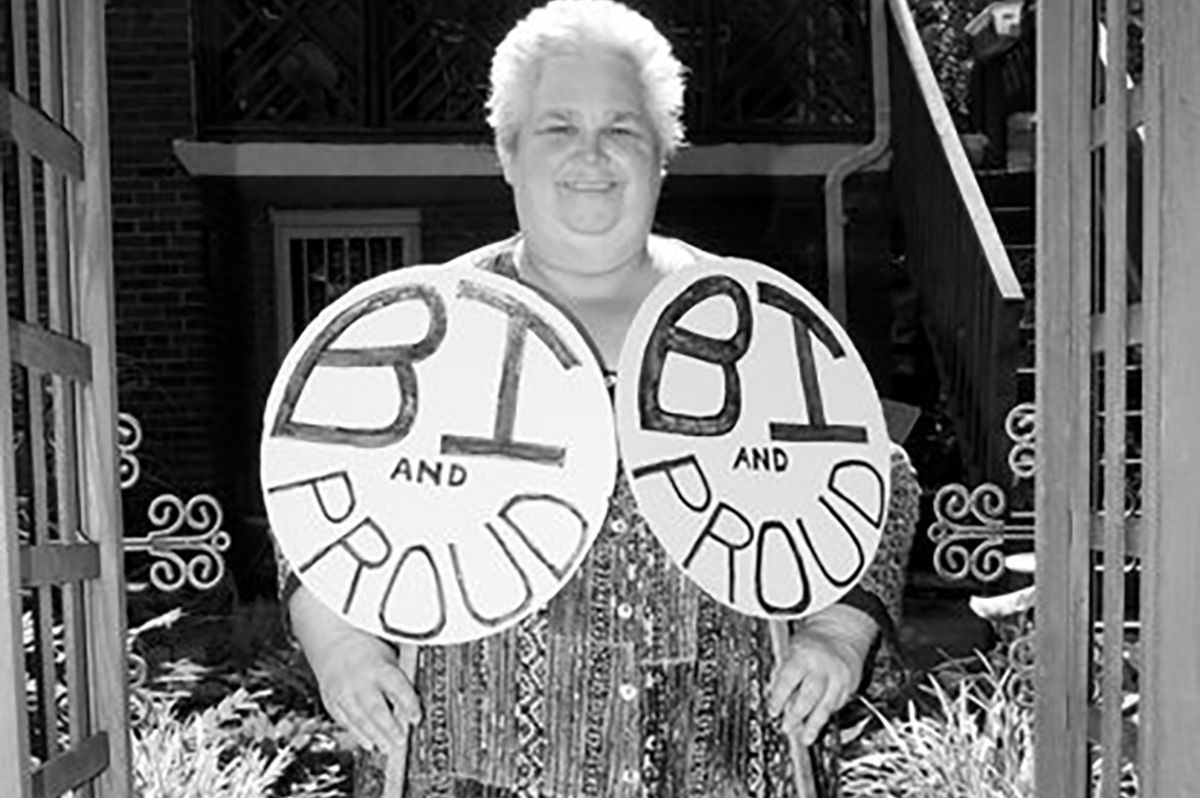
Loraine Adele Hutchins, a nationally known and acclaimed advocate for bisexual and LGBTQ rights, co-author and editor of a groundbreaking book on bisexuality, and who taught courses in sexuality, and women’s and LGBTQ studies at a community college in Maryland, died Nov. 19 from complications related to cancer. She was 77.
Hutchins, who told the Washington Blade in a 2023 interview that she self-identified as a bisexual woman, is credited with playing a lead role in advocating for the rights of bisexual people on a local, state, and national level as well as with LGBTQ organizations, many of which bi activists have said were ignoring the needs of the bi community up until recent years.
“Throughout her life, Loraine dedicated herself to working and speaking for those who might not be otherwise heard,” her sister, Rebecca Hutchins, said in a family write-up on Loraine Hutchins’s life and career.
Born in Washington, D.C., and raised in Takoma Park, Md., Rebecca Hutchins said her sister embraced their parents’ involvement in the U.S. civil rights movement.
“She was a child of the ‘60s and proudly recalls attending Martin Luther King’s ‘I Have a Dream’ speech with her mother on the D.C. Mall,” she says in her write-up. “She was steeped in the civil rights movement, was a member of the Student Non-Violent Coordinating Committee, and was proud to say she had an FBI record.”
The write-up says Hutchins received a bachelor’s degree from Shimer College in Mount Carroll, Ill. in 1970, and a Ph.D. in 2001 from Union Institute. It says she was also a graduate of the Institute for the Advanced Study of Human Sexuality’s Sexological Bodyworkers certification training program.
The family write-up says in the 1970s Hutchins became involved with efforts to assist tenants, including immigrant tenants, in affordable housing programs in D.C.’s Adams Morgan neighborhood.
“In 1991, she co-authored the groundbreaking book, ‘Bi Any Other Name: Bisexual People SPEAK OUT’ with friend and colleague Lani Ka’ahumanu,” the write-up says. It notes that the acclaimed book has been republished three times and in 2007 it was published in Taiwan in Mandarin.
According to the write-up, Hutchins delivered the keynote address in June 2006 at the Ninth International Conference on Bisexuality, Gender and Sexual Diversity. In October 2009, D.C.’s Rainbow History Project honored her as one of its Community Pioneers for her activist work.
“Loraine is one of the few people who has explained, defended and championed bisexuality and made sure the “B” got into the LGBT acronym,” the Rainbow History Project says on its website in a 2009 statement. “Sensitivity to bisexual issues, civil rights, and social justice issues is Loraine’s life work,” the statement concludes.
The write-up by her sister says that up until the time of her retirement, Hutchins taught women’s and LGBT studies as well as health issues in sexuality at Montgomery Community College and Towson University in Maryland.
“She was a friend and mentor to many in the LGBTQ community,” it says. “She thoroughly enjoyed adversarial banter on the many topics she held dear: sexuality, freedom of speech, civil rights, needs and support of those with disabilities, especially in the area of mobility, assisted housing, liberal politics and many other causes,” it points out.
She retired to the Friends House community in Sandy Springs, Md., where she continued her activism, the write-up concludes.
Hutchins was among several prominent bisexual activists interviewed by the Washington Blade at the time of her retirement in June 2023 for a story on the status of the bisexual rights movement. She noted that, among other things, in her role as co-founder the organizations BiNet USA and the Alliance of Multicultural Bisexuals, she joined her bi colleagues in prodding national LGBTQ advocacy organizations to improve their advocacy work for bisexuals, which Hutchins said had been inadequate in the past but had been improving in recent years.
Hutchins is survived by her sister, Rebecca Hutchins; her husband, Dave Lohman; nephew, Corey Lohman and his wife Teah Duvall Lohman; and cousins, the family write-up says.
It says a private memorial service was scheduled for December and a public memorial service recognizing her contributions to the LGBTQ community will be held in the spring of 2026.
Obituary
Acclaimed disability rights advocate Thomas Mangrum dies at 61
Lifelong D.C. resident also served as ‘cherished’ Capital Pride volunteer
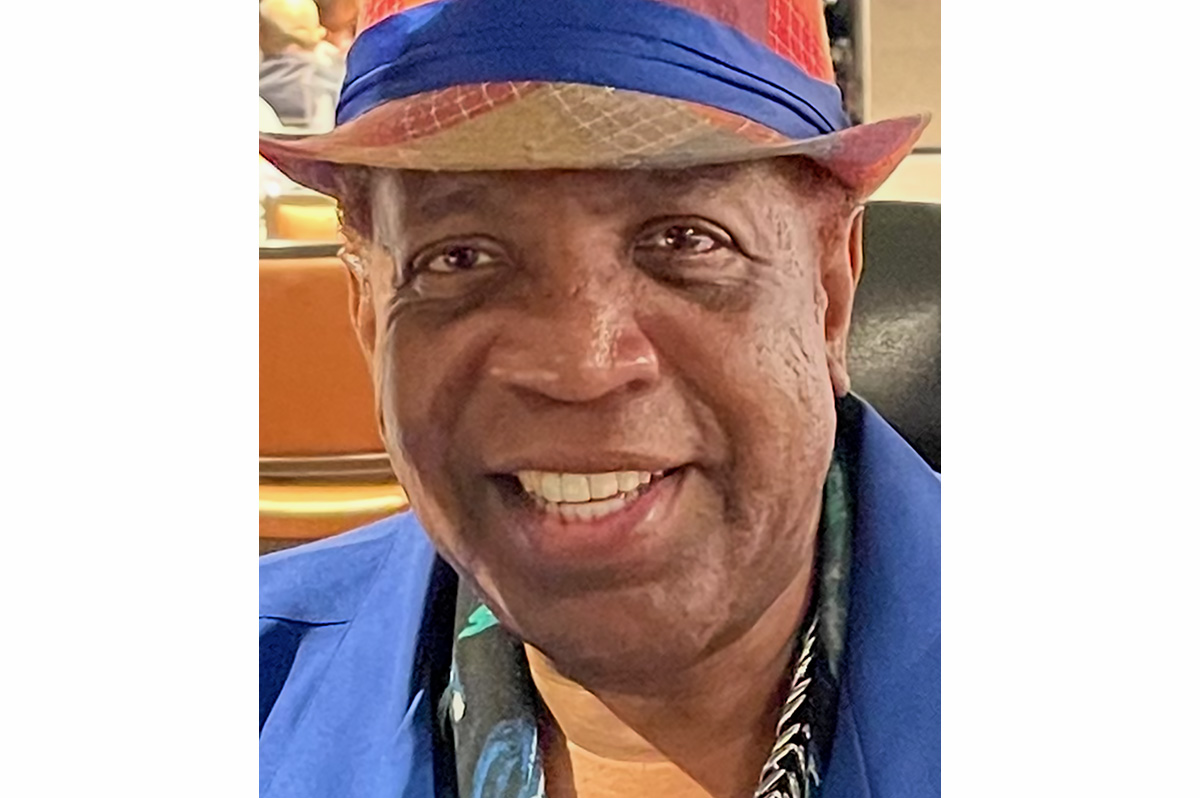
L. Thomas Magnum Jr., a lifelong D.C. resident, widely recognized and acclaimed advocate for people with disabilities, and LGBTQ rights activist involved in the city’s Capital Pride events, died Sept. 17 from complications related to stomach cancer. He was 61.
A statement released by Project ACTION!, a local disability advocacy organization for which Mangrum served for 15 years as co-president, says he worked for more than 20 years for the D.C.-based Maurice Electric Supply company before retiring in 2002 and devoting his efforts to disability-related projects and programs.
Phylis Holton, an official with the D.C. organization Quality Trust For Individuals With Disabilities and a longtime friend of Mangrum, said as a person with a developmental disability Mangrum devoted his life to supporting others with all forms of disabilities. She said that due to a separate spinal condition, Mangrum used a wheelchair for about 15 years prior to his passing.
Holton said Mangrum had a mild form of developmental disability, which the U.S. Centers for Disease Control and Prevention describes as “a group of conditions due to an impairment in physical, learning, language or behavior areas” that usually develops before a child is born during pregnancy.
Holton said Mangrum was an active member of Project ACTION! for 15 years prior to the 15 years he served as the organization’s co-president.
“He traveled nationally and presented at conferences, was featured on webinars and podcasts on a variety of topics related to self-advocacy, accessibility, equality, and more,” Holton told the Washington Blade in a statement.
“He shared his lived experience of being a Black man with a disability, and being gay, and how it impacted how he was treated in the community,” Holton said. “He was a strong advocate and co-facilitated trainings for independent advocacy organizations that Thomas supported and was a key advocate in their advocacy work,” she said.
Holton added, “He would answer a late request to train a group of attorneys, present at a meeting or testify before City Council or meet with an advocacy group to advance pending legislation that impacted people with disabilities.”
She said Mangrum also enjoyed participating in LGBTQ Pride events and last year traveled to the New York Pride events. According to Holton, he looked forward to participating in WorldPride 2025 events earlier this year in D.C. “but his illness prevented him from doing so.”
In a statement announcing Mangrum’s passing, Capital Pride Alliance, the group that organizes D.C.’s annual LGBTQ Pride events and served as the lead organizer of WorldPride 2025 in D.C., called Mangrum a “cherished volunteer” for D.C. Pride events.
June Crenshaw, the Capital Pride Alliance Deputy Director, said Mangrum served as a volunteer for D.C.’s LGBTQ Pride events “for many years” and was involved in many of the planning activities for WorldPride before his illness prevented him from participating in WorldPride earlier this year.
“He certainly in my interaction with him made me very aware of making sure that Capital Pride was thinking about accessibility always, and making sure that we had a welcoming, affirming accessible space for participants and staff with disabilities,” Crenshaw said.
In its statement on Mangrum’s career and accomplishments in life, Project ACTION! says he helped to advance the needs of people with disabilities through service on many boards and commissions. Among them were Lifeline Partnership, the D.C. Developmental Disabilities Council, the D.C. Center for Independent Living, the Washington Metropolitan Area Transportation Authority’s Accountability Advisory Committee, “and many more.”
“His leadership, passion, and unwavering commitment to equity and inclusion made a lasting impact on all who had the privilege to know and work alongside him,” the statement says.
It adds, “Thomas showed us the power of perseverance, courage, and the importance of standing together. His spirit will continue to guide us and strengthen our community for generations to come.”
A funeral for Mangrum was scheduled for Oct. 9, at D.C.’s Westminster Presbyterian Church at 400 I Street, S.W., with a viewing at 10 a.m. followed by a program at 11 a.m. A burial was scheduled to take place that same day at Heritage Memorial Cemetery at 13472 Poplar Hill Road in Waldorf, Md.
Holton said in lieu of flowers, donations may be made to Project ACTION! for a Celebration of Life and advocacy scholarship in Mangrum’s name. A date and location for the Celebration of Life for Mangrum was to be announced later, according to Project ACTION!
Obituary
Susan Xenarios, crime victim advocate, long-time LGBTQ ally, dies at 79
‘Susan was a force of nature, a mentor’
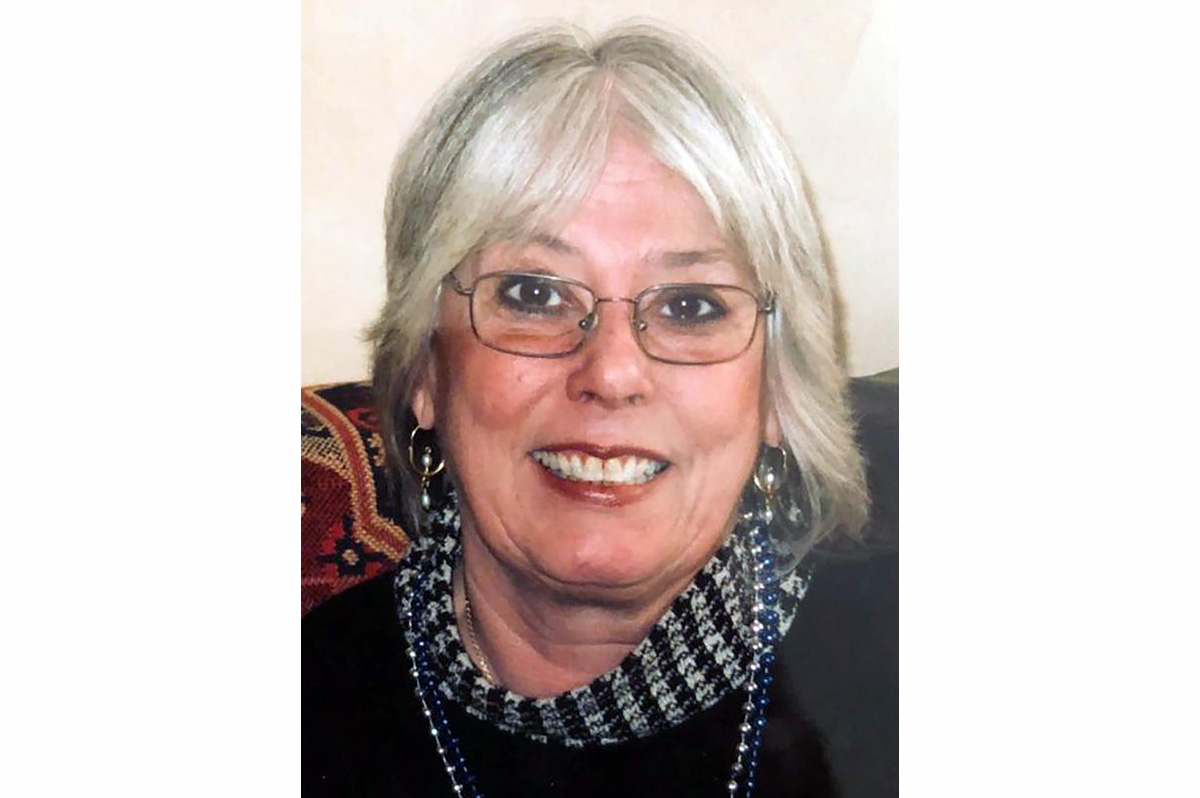
Susan Xenarios, LCSW, a visionary and dynamic leader of New York’s crime victim movement for 50 years and a courageous ally of the LGBTQ community, died on Sept. 6 in Manhattan. She was 79.
In 1974, an assailant held a knife to Ms. Xenarios’s throat and raped her on a rooftop in Upper Manhattan. At a time when few sexual assault victims spoke out, she began a lifelong, public campaign to improve the care and treatment of survivors and to reform laws and police procedures. Along with her high-profile advocacy, she never stopped counseling individual survivors of crime, pioneering breakthrough therapeutic interventions.
Ms. Xenarios led the creation of New York’s first program to provide assistance to survivors of sexual assault, the state’s first clinical program for male survivors, and the New York Sexual Assault Forensic Examiner (SAFE) Program, which ensures survivor-centered emergency room protocols, including evidence collection. She served as executive director of the Crime Victims Treatment Center in New York City for 40 years (1977 -2017).
Ms. Xenarios also was a driving force behind several state laws to advance the rights of crime survivors, including a 1993 law protecting the confidentiality of rape crisis center communications, the Hate Crimes Act 2000, which included enhanced penalties for hate-motivated crimes, including anti-LGBTQ assaults, and the 2015 “Enough is Enough” law, one of the first laws in the nation to require all colleges to adopt a set of comprehensive procedures for addressing sexual violence on campuses.
“Susan was a force of nature, a mentor, an extraordinary ally to the LGBT community, and a dear friend,” said Bea Hanson, director of the New York State Office of Victim Services, principal deputy director of the federal Office on Violence Against Women during President Barack Obama’s administration (2011-2017), and director of client services of the New York City Gay and Lesbian Anti-Violence Project (1991-1997). “She was a leader in advocating for the rights of sexual assault survivors and all crime victims. She spoke truth to power with a smile on her face and love in her heart. She will be missed.”
“Susan was the greatest champion and friend of LGBT victims of crime there ever was or ever will be,” said Matt Foreman, former executive director of the NYC Gay and Lesbian Anti-Violence Project (1990-1996) and the Empire State Pride Agenda (1996-2003). “She was one of the first to recognize the prevalence of sexual assault against men and she created the first program to help male survivors. When there was enormous pressure to pass a hate crimes law that did not include anti-LGBT offenses, she made sure the larger movement did not abandon us. She understood the harmful effects of having terms like ‘sodomy’ and ‘deviate sexual intercourse’ in New York State law and led the successful drive to purge them from the books. She was so genuinely warm and supportive, I was shocked when I learned that she wasn’t a lesbian.”
A memorial service will be held on Saturday, Sept. 20, at 11 a.m. at West End Collegiate Church, 245 W. 77th St. in Manhattan.
-

 National5 days ago
National5 days agoTrump falsely links trans people to terrorism
-

 Virginia5 days ago
Virginia5 days agoFellow lawmakers praise Adam Ebbin after Va. Senate farewell address
-

 National5 days ago
National5 days agoLGBTQ activists mourn the Rev. Jesse Jackson
-

 Massachusetts4 days ago
Massachusetts4 days agoEXCLUSIVE: Markey says transgender rights fight is ‘next frontier’

